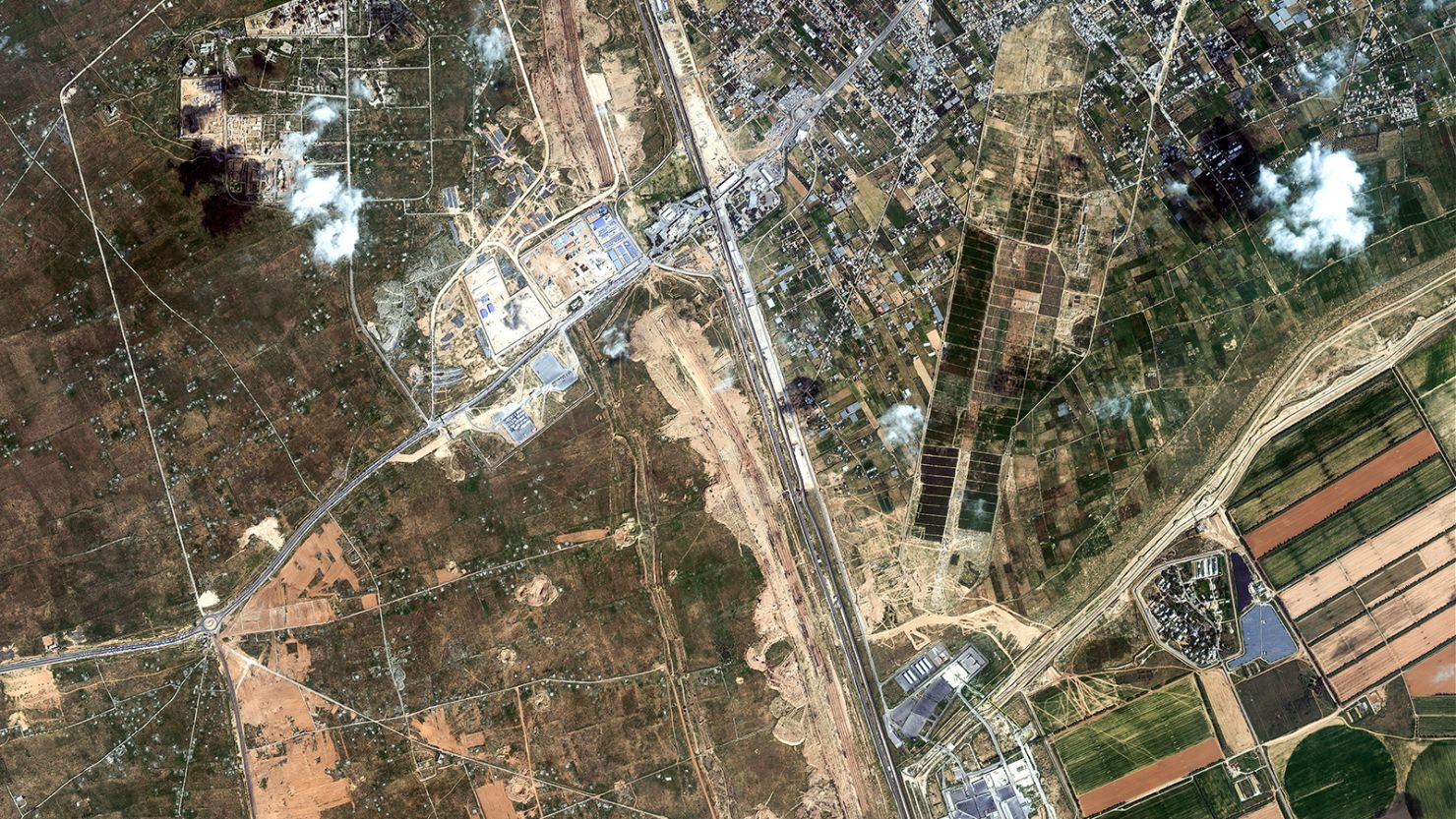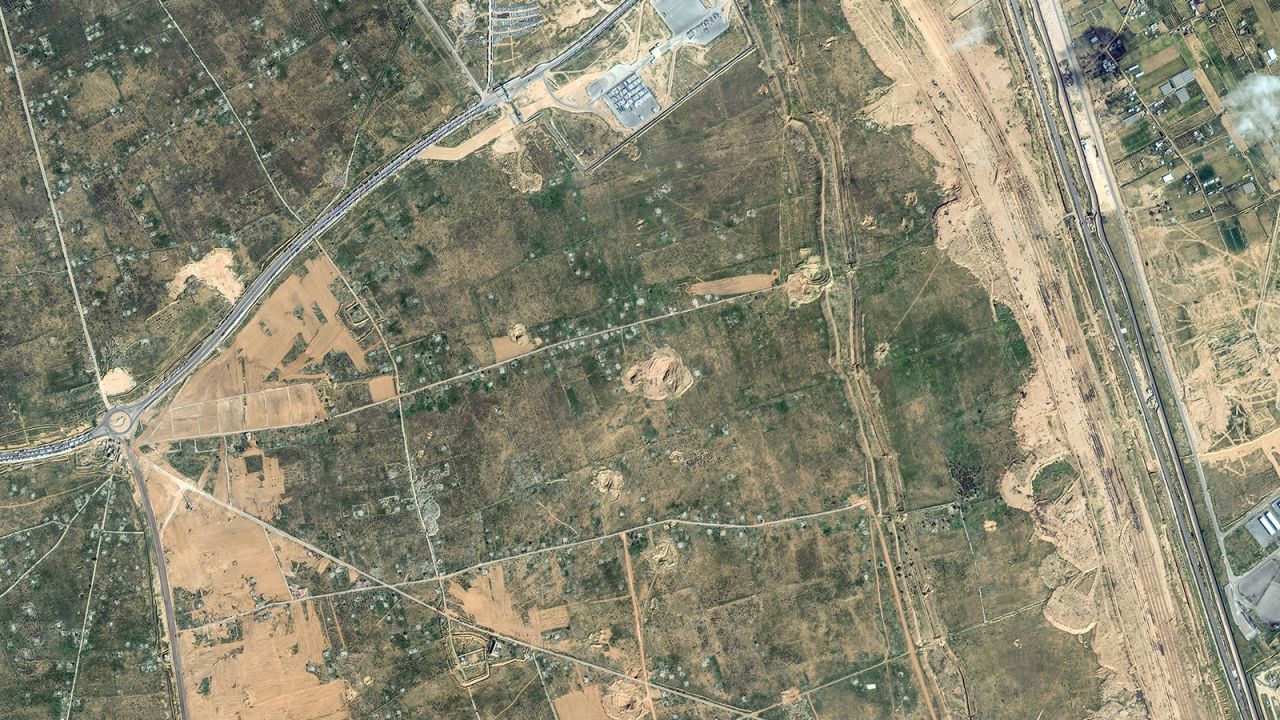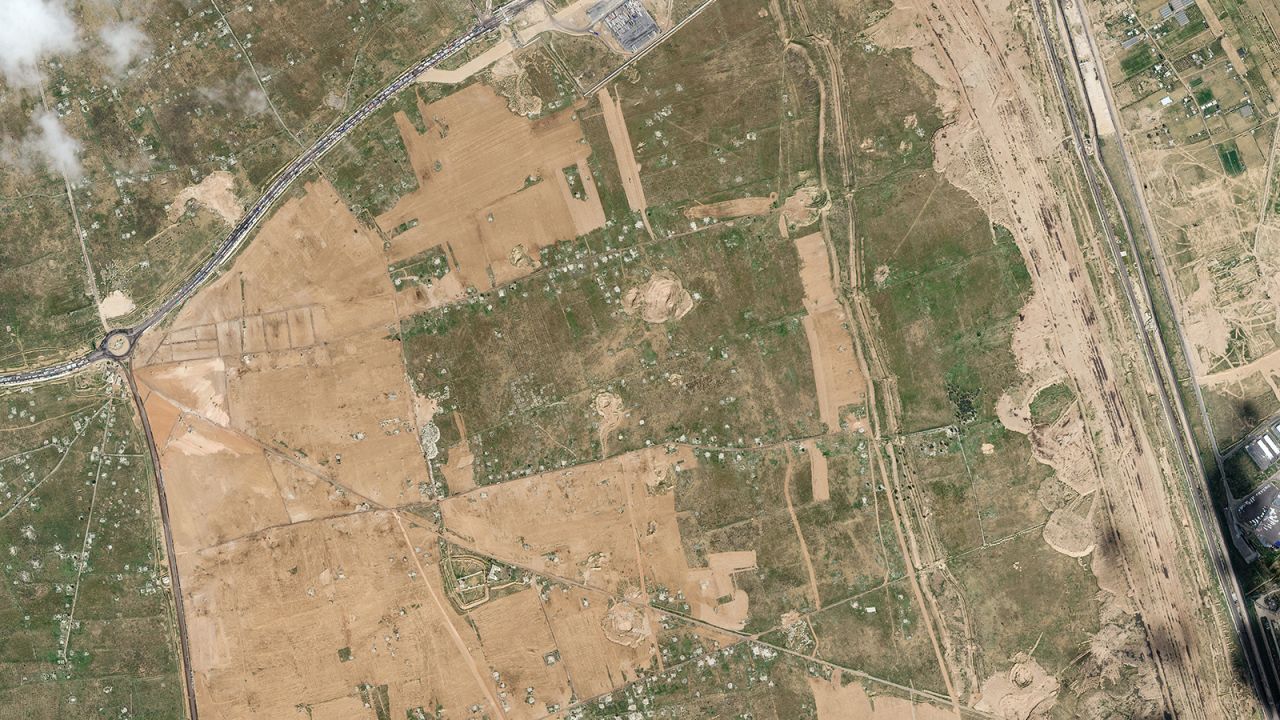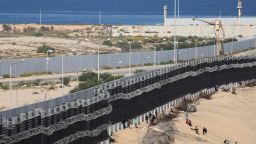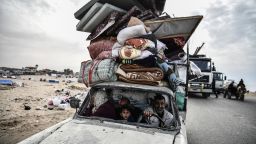Egypt is building a massive miles-wide buffer zone and wall along its border with southern Gaza, new satellite images show, as fears grow over Israel’s planned ground offensive in Rafah where more than half of Gaza’s population is sheltering.
The images, taken in the past five days by Maxar Technologies, show a significant section of Egyptian territory between a roadway and the Gaza border has been bulldozed.
If the buffer zone?— which stretches from the end of the Gaza border to the Mediterranean Sea — is completed, it will completely engulf the Egyptian-Rafah border crossing complex.
At the actual border, multiple cranes can be seen laying sections of wall.
Additional satellite imagery reviewed by CNN shows that bulldozers arrived on site on February 3, and the initial excavation of the buffer zone began on February 6.
There has been a significant uptick in excavation in the last five days.
Videos released by the Sinai Foundation for Human Rights show construction of the border wall, which they claim is five meters (16 feet) high.
The organization, a non-governmental human rights group made up of activists, researchers and journalists, said that two local contractors told them that it was commissioned by the Egyptian armed forces.
CNN has reached out to the Egyptian government for comment on the buffer zone and wall construction.
The construction comes as fears grow that the already horrific humanitarian situation in Gaza will worsen, causing thousands of deaths and a?mass exodus of Palestinians to?Egypt’s border.
All eyes are on Rafah, situated along the new buffer zone, where nearly 1.5 million?Palestinians are crammed into?a massive tent city.
Despite international pressure, Israeli Prime Minister Benjamin Netanyahu has reiterated plans for a military ground offensive in the southern Gazan city, saying it is Hamas’ “last bastion.”
Israel Defense Forces spokesperson Lt. Col. Peter Lerner told CNN earlier this week that the military aims to create a plan that evacuates civilians “out of harm’s way” and differentiates civilians from Hamas militants. However, it has not yet presented its evacuation plan to the government, he told CNN on Tuesday.
The?city?is the last remaining refuge in Gaza for displaced Palestinians, and panic is soaring as many decide whether to stay or leave ahead of the planned ground offensive. Families struggling with shortages of food, water and medicine are living in tents just meters from the barbed-wire fence separating them from Egypt. Most have trekked to Rafah after being displaced by the war elsewhere in Gaza.
Rajaa Musleh, the Gaza?representative for the nonprofit organization MedGlobal, currently based in Rafah, painted a vivid picture of the situation in the besieged town, saying that health workers who are still alive “may still be breathing, but we are dying inside.”
“The situation we are enduring in Rafah is horrific and getting worse every day. We do not have water to drink or food to eat, and our health care facilities can hardly operate,” Musleh said.
A growing number of countries and international organizations have called on Israel to avoid a ground operation in what is now Gaza’s most populated city, with?the?International Committee of?the?Red Cross?regional director Fabrizio Carboni saying “countless lives are hanging in the balance.” The leaders of Australia, Canada and New Zealand warned on Thursday that such an incursion “would be catastrophic.”
Egypt has already condemned Israel’s move to push Palestinians southward in the enclave, suggesting it is part of a plan?to expel Gazans and that it would spell the end of the?Palestinian cause. Egypt has now sounded alarms again as Israel prepares for its military operation in Rafah.
Egypt began?boosting its security presence?at its border with Gaza?as?a “precautionary” measure ahead of?the?expected Israeli ground operation, Egyptian security officials told CNN. As part of its security buildup, the officials said, Egypt has deployed more troops and machinery in North Sinai, bordering Gaza.
Checkpoints leading to the Rafah border crossing on the Egyptian side were also fortified with more soldiers and the areas around the main road were being prepared for the deployment of tanks and military machinery, a witness told CNN.
It comes as Netanyahu continues to rail against Egypt for not closing the Philadelphi?Corridor – the strip of land between Egypt and Gaza and the besieged enclave’s only non-Israeli-controlled border.?In a press briefing on January 13, Netanyahu said that Israel would not consider the war over until it was closed.
Israel has been accused of constructing its own buffer zone, but within Gaza, which would effectively shrink the enclave’s borders.?UN High Commissioner for Human Rights Volker Türk said in a February 8 statement that the IDF had been destroying Gaza buildings “that are within a kilometer of the Israel-Gaza fence, clearing the area with the objective of creating a ‘buffer zone.’”
“Israel has not provided cogent reasons for such extensive destruction of civilian infrastructure,”?Türk?went on to say.
CNN’s Nadeen Ebrahim?and Sarah El Sirgany contributed to this report.

